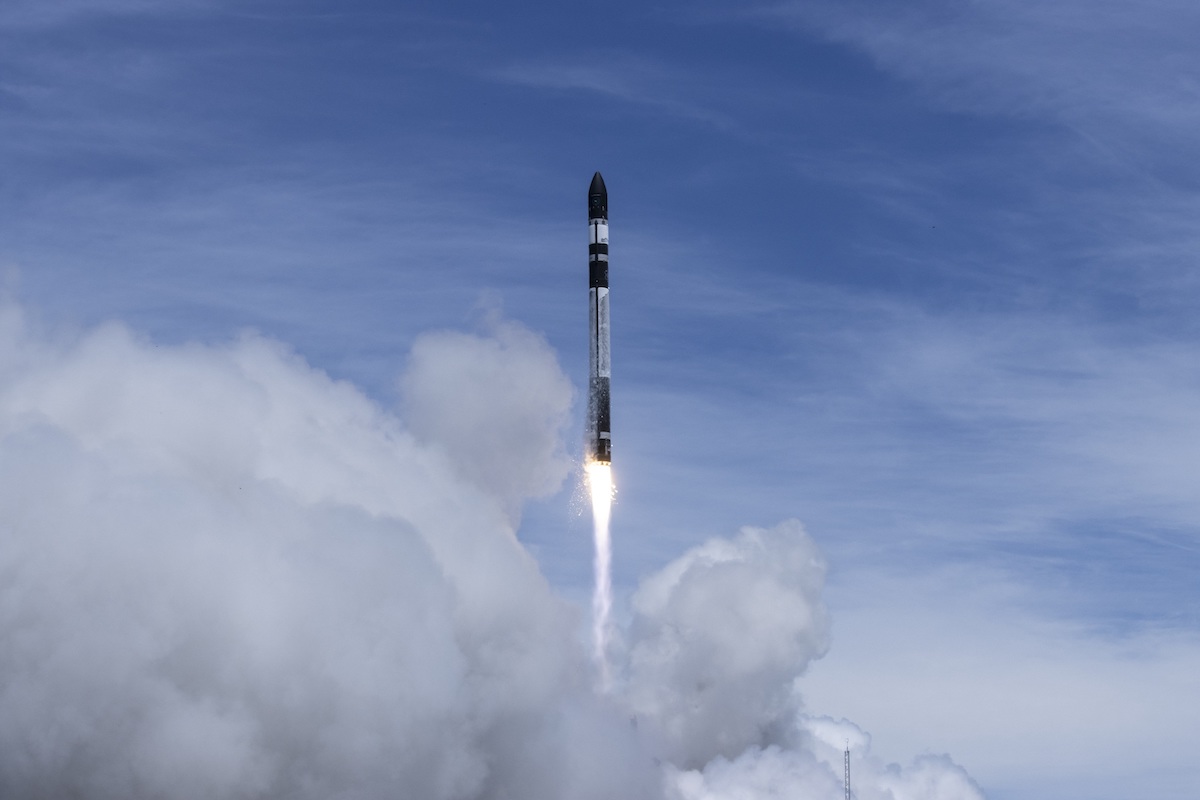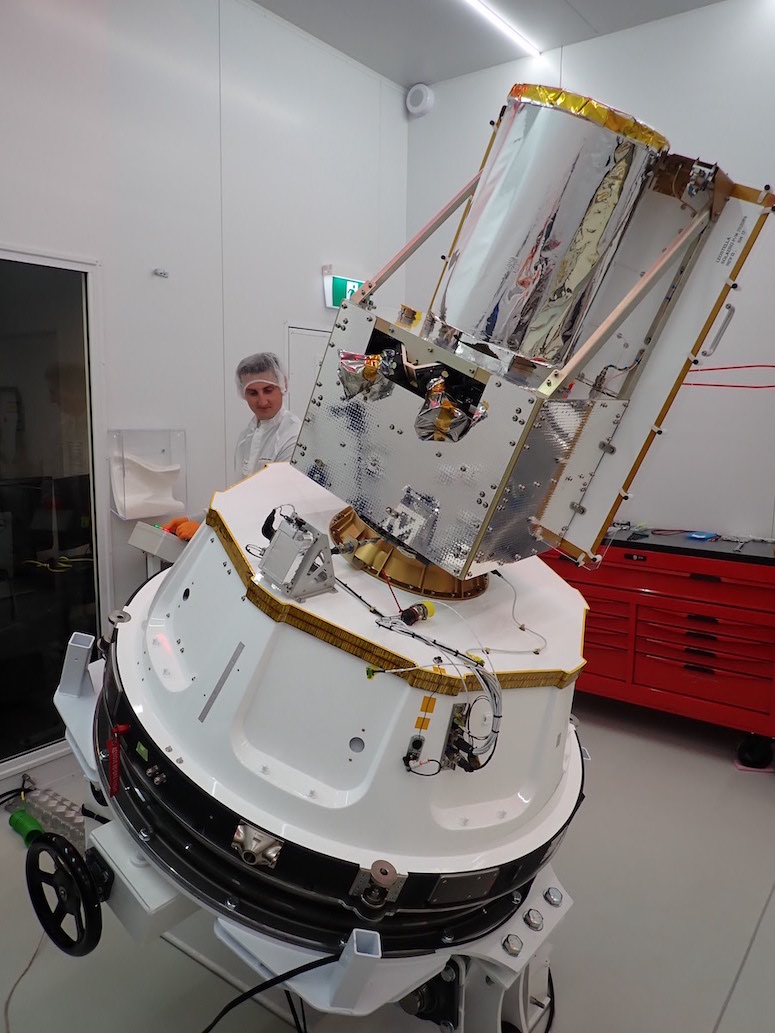
Two more BlackSky high-resolution optical remote sensing satellites rode a Rocket Lab Electron launcher into orbit Wednesday from New Zealand, the second mission for Rocket Lab in three weeks, and the third satellite delivery for BlackSky in the same period.
The two microsatellites, each about the size of a small refrigerator, flew into space stacked one on top of the other inside the nose cone of Rocket Lab’s Electron launch vehicle.
The launch was the third mission to deliver BlackSky Earth observation satellites into orbit in less than a month, following a dedicated Rocket Lab mission with two spacecraft Nov. 17, and a SpaceX launch from Cape Canaveral on Dec. 2 that carried two BlackSky payloads as rideshare passengers with a batch of Starlink internet satellites.
The 59-foot-tall (18-meter) Electron rocket fired its nine Rutherford main engines and lifted off from Mahia Pensinula, located on the east coast of the North Island of New Zealand, at 7:02:07 p.m. EST Wednesday (0002:07 GMT Thursday).
The launch occurred at 1:02 p.m. Thursday in New Zealand.
Producing more than 50,000 pounds of thrust, the kerosene-burning first stage steered Rocket Lab’s sixth and final mission of the year on a course east from the New Zealand coastline. The booster shut down and detached two-and-a-half minutes after liftoff to fall into the Pacific Ocean.
Unlike the Nov. 17 launch for BlackSky, Rocket Lab did not plan to recover the Electron booster on Wednesday’s mission.
A single Rutherford engine on the second stage ignited to lob the twin BlackSky satellites into a preliminary parking orbit. During the six-minute second stage burn, the Electron rocket shed its clamshell-like carbon fiber composite nose cone and swapped batteries powering the engine’s pumps.
The Electron’s second stage released a kick stage about nine minutes after launch. The kick stage flew halfway around the world before igniting its Curie engine to place the BlackSky satellites into an orbit targeted at an altitude 267 miles (430 kilometers), with an inclination of 42 degrees to the equator.
Rocket Lab said both BlackSky satellites separated from the kick stage on time, and in the correct orbit.
“Congratulations and welcome to space once again, BlackSky,” said Peter Beck, Rocket Lab’s CEO. “These back-to-back missions are a showcase of the benefits of rapid-launch in action: quick constellation expansion, streamlined access to space, and fast delivery of global insights to BlackSky customers that Rocket Lab is proud to facilitate with dedicated launch on Electron.”
Liftoff of an Electron launch vehicle from New Zealand, sending two more BlackSky Earth-imaging satellites to orbit on Rocket Lab’s sixth and final launch of 2021. https://t.co/GxEZWdFWJJ pic.twitter.com/6n8wA8vbF8
— Spaceflight Now (@SpaceflightNow) December 9, 2021
The new satellites add to BlackSky’s remote sensing spacecraft collecting imagery for sale to commercial customers and the U.S. government.
“That’s two more satellites successfully on orbit and in good shape, topping off our constellation with 12 satellites total,” said Nick Merski, BlackSky’s chief operating officer.
Each BlackSky satellite weighs about 121 pounds (55 kilograms). The satellites are built by LeoStella, a joint venture between BkackSky and Thales Alenia Space, a major European satellite manufacturer. LeoStella’s production facility is located in Tukwila, Washington, a suburb of Seattle.
BlackSky, with offices in Seattle and Herndon, Virginia, is deploying a fleet of small remote sensing satellites to provide high-resolution Earth imagery to commercial and government clients.
One big customer for BlackSky, with offices near Seattle and in the Washington, D.C., metro area, is the U.S. military and intelligence agencies. BlackSky has agreements to sell commercial imagery to NASA, the National Reconnaissance Office and the National Geospatial-Intelligence Agency.
Rocket Lab and BlackSky announced an agreement earlier this year for five Electron launches to carry nine BlackSky satellites into orbit.
The first launch in the multi-mission contract successfully deployed a single BlackSky payload into orbit in March. The second of the five missions in May failed before reaching orbit due to a malfunction in the Electron rocket’s second stage. The two BlackSky satellites on-board crashed back to Earth, a loss the company valued at $18.4 million, including the spacecraft and launch services.
Wednesday’s flight marked the fourth mission under the multi-launch agreement. The next Rocket Lab mission in early 2022 will complete the five-launch contract with BlackSky. Spaceflight, a Seattle-based rideshare company, brokered the launch agreement for BlackSky.
Including the two spacecraft deployed Wednesday, 13 BlackSky satellites have successfully launched since 2018, following a 2016 launch that deployed a technology demonstration satellite for the company.
BlackSky officials hope to have around 30 satellites in orbit by the mid-2020s.

Adding more satellites allows BlackSky’s fleet to collect more timely images of locations around the world. The period of time between satellite passes is called a revisit time.
“BlackSky is pushing the boundaries of operational pace and agility in how we introduce new satellite capacity to customers,” Merski said a BlackSky press release. “High revisit rates create what we believe is a strategic intelligence advantage and extraordinary value for our government and commercial customers about locations that matter to them.”
The successful launch Wednesday was Rocket Lab’s sixth and final mission of the year. It was the 23rd flight overall for Rocket Lab’s small-class Electron satellite launcher.
Rocket Lab’s year included the failed Electron launch in May, and months of schedule delays stemming from the COVID-19 pandemic, and New Zealand’s stringent lockdowns.
Missions on Rocket Lab’s schedule for 2022 include the launch of a NASA small satellite heading to the moon. The CAPSTONE lunar smallsat mission will be Rocket Lab’s first launch to another planetary body.
Rocket Lab, a U.S.-based company, also hopes to launch its first mission from a new facility at Wallops Island, Virginia, next year, as well as inaugurate a second launch pad in New Zealand to support a higher flight rate.
Email the author
Follow Stephen Clark on Twitter: @StephenClark1.
